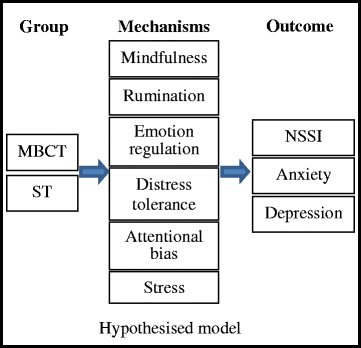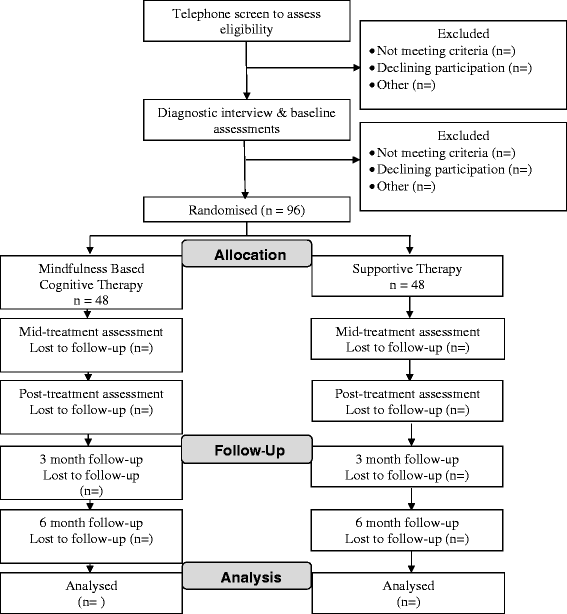Group mindfulness based cognitive therapy vs group support for self-injury among young people: study protocol for a randomised controlled trial
- PMID: 26152135
- PMCID: PMC4495689
- DOI: 10.1186/s12888-015-0527-5
Group mindfulness based cognitive therapy vs group support for self-injury among young people: study protocol for a randomised controlled trial
Abstract
Background: Non-suicidal self-injury (NSSI) is a transdiagnostic behaviour that can be difficult to treat; to date no evidence based treatment for NSSI exists. Mindfulness Based Cognitive Therapy (MBCT) specifically targets the mechanisms thought to initiate and maintain NSSI, and thus appears a viable treatment option. The aims of the current study are to test the ability of MBCT to reduce the frequency and medical severity of NSSI, and explore the mechanisms by which MBCT exerts its effect.
Methods/design: We will conduct a parallel group randomised controlled trial of Mindfulness Based Cognitive Therapy (MBCT) versus Supportive Therapy (ST) in young people aged 18-25 years. Computerised block randomisation will be used to allocate participants to groups. All participants will meet the proposed DSM-5 criteria for NSSI (i.e. five episodes in the last twelve months). Participants will be excluded if they: 1) are currently receiving psychological treatment, 2) have attempted suicide in the previous 12 months, 3) exhibit acute psychosis, 4) have a diagnosis of borderline personality disorder, or 5) have prior experience of MBCT. Our primary outcome is the frequency and medical severity of NSSI. As secondary outcomes we will assess changes in rumination, mindfulness, emotion regulation, distress tolerance, stress, and attentional bias, and test these as mechanisms of change.
Discussion: This is the first randomised controlled trial to test the efficacy of MBCT in reducing NSSI. Evidence of the efficacy of MBCT for self-injury will allow provision of a brief intervention for self-injury that can be implemented as a stand-alone treatment or integrated with existing treatments for psychiatric disorders.
Trial registration: Australian New Zealand Clinical Trials Registry Number ACTRN12615000023550 . Registered 16 January 2015.
Figures
References
-
- Martin G, Swannell S, Harrison J, Hazell P, Taylor A. The Australian national epidemiological study of self-injury (ANESSI) Brisbane, Australia: Center for Suicide Prevention Studies; 2010.
-
- Wilkinson P, Goodyer I. Non-suicidal self-injury. Eur Child Adoles Psychiatry. 2013;22: Supp 1, S75-79 - PubMed
-
- Tovell A, McKenna K, Bradley C, Pointe S. Hospital separations due to injury and poisoning, Australia 2009–10. Injury research and statistics series no. 69. Cat. no. INJCAT 145. AIHW.: Canberra; 2012.
Publication types
MeSH terms
Associated data
LinkOut - more resources
Full Text Sources
Other Literature Sources
Medical
Research Materials



